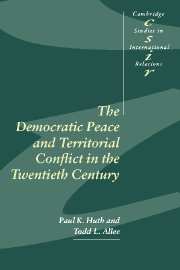Book contents
- Frontmatter
- Contents
- List of figures
- List of tables
- Acknowledgments
- 1 Another study of democracy and international conflict?
- 2 Pathways to conflict escalation and resolution in international disputes
- 3 The international strategic context
- 4 Domestic institutions and the Political Accountability Model
- 5 Domestic institutions and the Political Norms Model
- 6 Domestic institutions and the Political Affinity Model
- 7 Empirical results for decisions to challenge the status quo
- 8 Empirical results for decisions to offer concessions in negotiations
- 9 Empirical results for decisions to escalate with military force
- 10 What have we learned about the democratic peace?
- Appendices A–F
- Bibliography
- Index
- CAMBRIDGE STUDIES IN INTERNATIONAL RELATIONS
1 - Another study of democracy and international conflict?
Published online by Cambridge University Press: 22 September 2009
- Frontmatter
- Contents
- List of figures
- List of tables
- Acknowledgments
- 1 Another study of democracy and international conflict?
- 2 Pathways to conflict escalation and resolution in international disputes
- 3 The international strategic context
- 4 Domestic institutions and the Political Accountability Model
- 5 Domestic institutions and the Political Norms Model
- 6 Domestic institutions and the Political Affinity Model
- 7 Empirical results for decisions to challenge the status quo
- 8 Empirical results for decisions to offer concessions in negotiations
- 9 Empirical results for decisions to escalate with military force
- 10 What have we learned about the democratic peace?
- Appendices A–F
- Bibliography
- Index
- CAMBRIDGE STUDIES IN INTERNATIONAL RELATIONS
Summary
Introduction
Over the past decade numerous books and countless articles have been published on the theoretical and empirical relationship between democracy and international conflict. The central theoretical claim advanced by scholars is that decisions by state leaders to rely upon either peaceful diplomacy or military force as the means to resolve international disputes are influenced by the political institutions and norms of political competition and conflict resolution within states. As a result, analysts have argued that patterns of international conflict behavior should vary between democratic and non-democratic countries because of differences in the degree of state leaders' political accountability, or the strength of nonviolent norms of resolving political conflict among political elites (e.g. Bueno de Mesquita and Lalman 1992; Bueno de Mesquita, Morrow, Siverson, and Smith 1999; Dixon 1993, 1994, 1998; Doyle 1986; Kahl 1998/99; Maoz and Russett 1992, 1993; Owen 1994, 1997; Raymond 1994; Rummel 1983, 1985; Russett 1993; Schweller 1992; Weart 1998).
In empirical research scholars have examined patterns of military conflict between democracies and non-democracies, as well as among the two types of states. Two different conclusions have emerged from empirical findings. The first, more widely accepted, claim is that while democratic states rarely if ever go to war against each other, they do adopt more confrontational diplomatic and military policies towards non-democratic states. Thus, patterns of military conflict between democracies and non-democracies are not very different from patterns of military conflict among non-democracies.
- Type
- Chapter
- Information
- Publisher: Cambridge University PressPrint publication year: 2003



